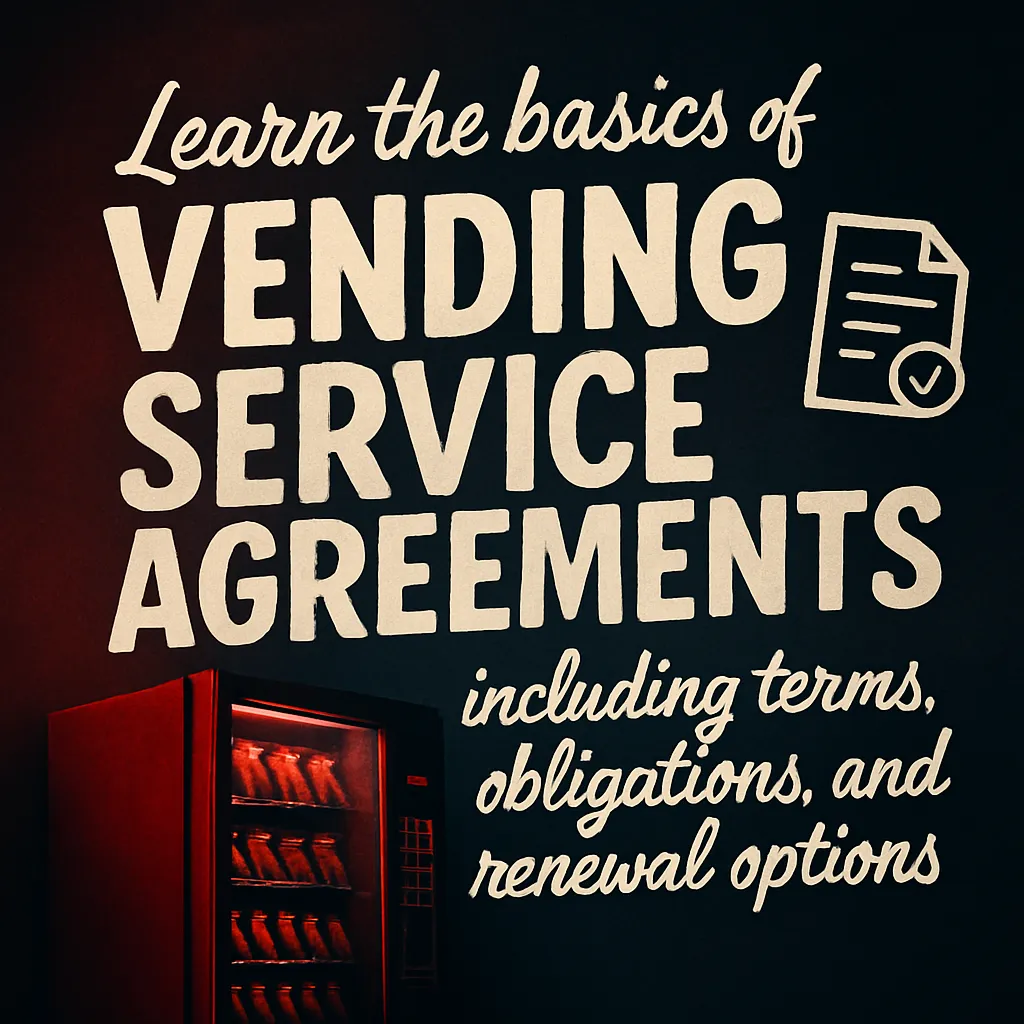Understanding Vending Service Contracts
Learn the basics of vending service agreements, including terms, obligations, and renewal options.
Back to Vending Contracts ResourcesLearn the basics of vending service agreements, including terms, obligations, and renewal options.
Back to Vending Contracts ResourcesA well-structured vending contract ensures clarity and safeguards the interests of both the business and the service provider, establishing a foundation for a successful partnership.
![]() Define clear terms for machine placement and operation
Define clear terms for machine placement and operation
![]() Outline service expectations and maintenance schedules
Outline service expectations and maintenance schedules
![]() Establish transparent financial arrangements and commissions
Establish transparent financial arrangements and commissions

Entering into a vending machine service agreement requires a clear understanding of its components to ensure a beneficial partnership. These contracts are fundamental, defining the mutual responsibilities and expectations between your business and the vending service provider. They serve as a roadmap, covering everything from the type of machines installed to the frequency of restocking and how revenue sharing is managed.
One of the first aspects to scrutinize is the contract duration and any exclusivity clauses. Some contracts might tie you into a long-term agreement, limiting your flexibility to explore other options. It's crucial to understand if your contract contains an exclusivity clause in your vending contract, which ensures that only a single vendor can operate machines on your premises. This can be beneficial for streamlined service but may prevent you from diversifying machine types or product selections with different providers.
Revenue sharing and commission structures are also key elements. Contracts specify how profits from machine sales will be divided. This could be a fixed percentage or a tiered system based on sales volume. Always ensure these terms are transparent and align with industry standards. Understanding how commissions work in vending contracts is vital for accurately projecting potential earnings and ensuring fairness.
Beyond the financial terms, the contract should clearly outline service level agreements (SLAs). This includes specifics on machine maintenance, repair response times, and restocking schedules. A good SLA guarantees that machines remain operational and well-stocked, which directly impacts user satisfaction. It’s equally important to know what happens if either party needs to cancel a vending contract early, as termination clauses can involve fees or specific conditions.
Comprehensive contracts also address product selection, pricing policies, and payment methods available in the machines. For instance, if your business wants to promote healthier options or offer specific branded products, the contract should reflect these preferences. Reviewing these details upfront helps prevent misunderstandings and ensures the vending service meets the specific needs and demographics of your location.
A vending service contract is a formal agreement between a business and a vending service provider, outlining the terms and conditions for installing, maintaining, and stocking vending machines on the business's premises.
It clarifies expectations, responsibilities, service levels, commission rates, and dispute resolution for both parties, ensuring a smooth and mutually beneficial operation.
Key elements typically include machine type and quantity, product selection, service schedule, commission structure, contract duration, and clauses for early termination or renewal.
An exclusivity clause states that only one specific vending service provider can operate machines within the agreed-upon location during the contract term.
Commission rates can be a fixed percentage of sales or a flat monthly fee, often negotiated based on sales volume expectations and location foot traffic.
Ensure the contract specifies response times for repairs, restocking frequency, and cleanliness standards to guarantee reliable service.
Most contracts include early termination clauses, which may involve penalties or require advance notice. It's crucial to understand these terms before signing.
Contract lengths vary, but common durations are 1 to 5 years, often with options for renewal. Short-term contracts offer more flexibility, while long-term may secure better rates.
The contract usually outlines how product offerings are chosen, whether it's solely up to the provider or if the business has input on specific items, especially for healthy or specialized choices.
This is typically outlined in the contract; in most full-service agreements, the location provides electricity at no direct cost to the vendor, but it should always be confirmed.